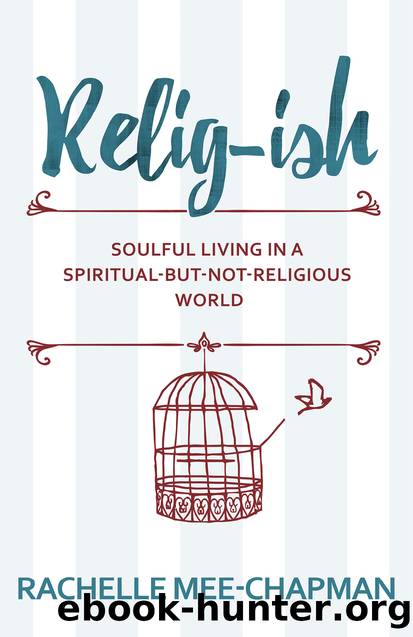Relig-ish by Mee-Chapman Rachelle;

Author:Mee-Chapman, Rachelle;
Language: eng
Format: epub
Publisher: Chalice Press
Published: 2016-07-25T00:00:00+00:00
Living Rituals
I donât know exactly what prayer is.
I do know how to pay attention, how to fall down
into the grass, how to kneel down in the grass,
how to be idle and blessed . . .â
âMary Oliver, âThe Summer Dayâ
I believe poets are our prophets, and one my most relied upon seers is Mary Oliver. I especially appreciate this passage, from âThe Summer Day.â I love how Oliver takes an ordinaryâsome might say frivolousâmoment and turns it into prayer. (Or maybe itâs more that she is paying attention, so she notices that it is already prayer.) After naming this everyday moment as something transcendent, Oliver goes on to ask, âTell me, what is it you plan to do with your one wild and precious life?â Itâs from this last questioning line of the poem that my online community, Flock, takes its most long-running ritual. Each Sunday evening, as we set our intentions for the upcoming week, we ask one another, âTell me, what is it you intend to do with your one wild, precious life?â
We have only this one life that weâre sure of, friend. Wild and mysterious, precious and treasured, everyday and overly familiarâand it is our ultimate task to honor it and live it well. To pay attention, and name the ordinary for what it truly isâsacred. To help you do that, I invite you to treat your daily rhythm as ritual, as an act of self-care and soulcare.
As religious folks, we got used to having the familiar rhythms around us, demarcated by rituals. For the purpose of our work together here we will define a ritual as a set of repeated actions and words, that along with symbolic objects, help us connect more concretely with otherwise unseen and untouchable truths. In our religious past we may have had daily, weekly, and seasonal rituals. Turning the pages of leather Bibles with onion-skin thin pages at morning devotions. Folding hands and bowing heads at evening prayers with an uttered âAmen.â Bread and wine passed on Sunday mornings with the whispered words, âTake, and eat.â Candles and prayers of Friday nights. Sacred objects. Sacred words. Sacred action. These were the rituals that held our truths and kept them front and center in the buzz of our daily life.
While the beliefs behind these rituals may have shifted, and their functionality may have ebbed, the need and the hunger for ritual remains. Yet without the formality of church or temple, the everyday parts of our life can seem too mundane to be holy. Feeding the dog. Washing the dishes. Washing ourselves. Going to bed. All of these things can hang on us like a choreâmundane activities from a mundane existence.
What I want to tell you friend, is this. You can dismiss most of your life by naming it mundane, or you can value these ordinary things for what they really areâthe building blocks of your be-ing and the DNA of your life.
You can decry the actions of your daily life as profane, or you can honor them as sacred.
Download
This site does not store any files on its server. We only index and link to content provided by other sites. Please contact the content providers to delete copyright contents if any and email us, we'll remove relevant links or contents immediately.
| Clergy | Devotionals |
| Faith | Inspirational |
| Meditations | Monasticism & Asceticism |
| Prayer | Prayerbooks |
| Ritual | Sermons |
More Language of Letting Go: 366 New Daily Meditations by Melody Beattie(2456)
The Holy Spirit by Billy Graham(2430)
To Light a Sacred Flame by Silver RavenWolf(2360)
The Secret Power of Speaking God's Word by Joyce Meyer(2260)
Tuesdays With Morrie by Mitch Albom(2179)
The Lost Art of Good Conversation by Sakyong Mipham(2130)
The Traveler's Gift by Andy Andrews(2019)
Kundalini by Gopi Krishna(1829)
A Kingsbury Collection by Karen Kingsbury(1726)
Finding Chika by Mitch Albom(1649)
Angels of God: The Bible, the Church and the Heavenly Hosts by Mike Aquilina(1632)
As a Man Thinketh by James Allen(1583)
Angels by Billy Graham(1556)
The Yoga of Jesus: Understanding the Hidden Teachings of the Gospels by Paramahansa Yogananda(1534)
Curse Tablets and Binding Spells from the Ancient World by Gager John G.;(1516)
Barking to the Choir by Gregory Boyle(1509)
Autobiography of a Yogi (Complete Edition) by Yogananda Paramahansa(1492)
How To Be Born Again by Billy Graham(1408)
Anxious for Nothing by Max Lucado(1406)
